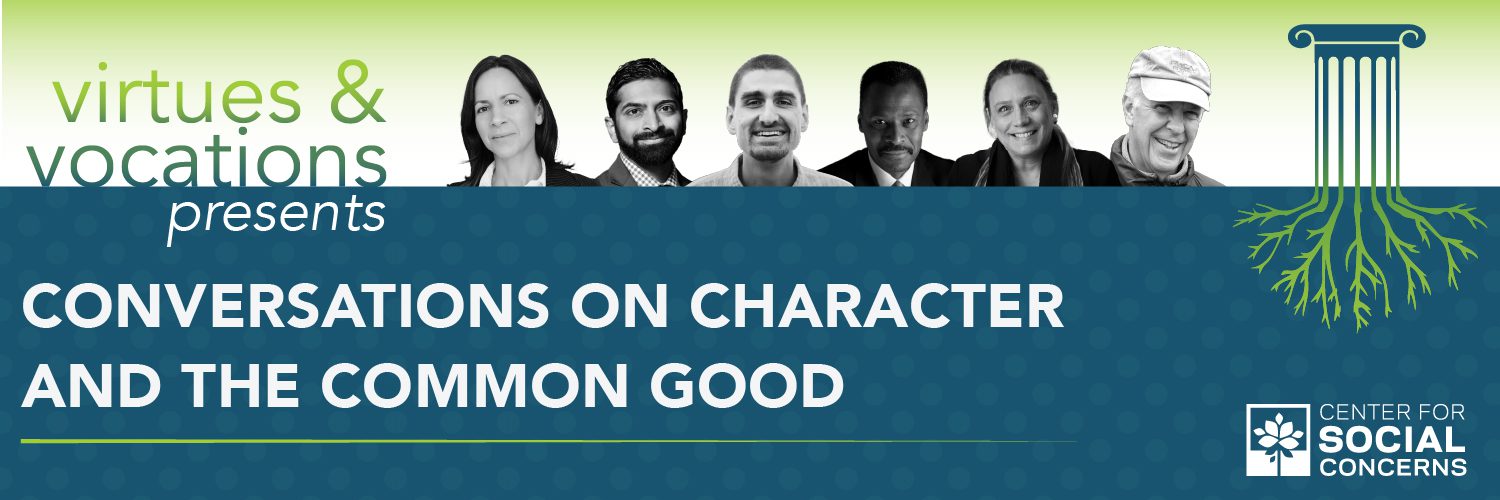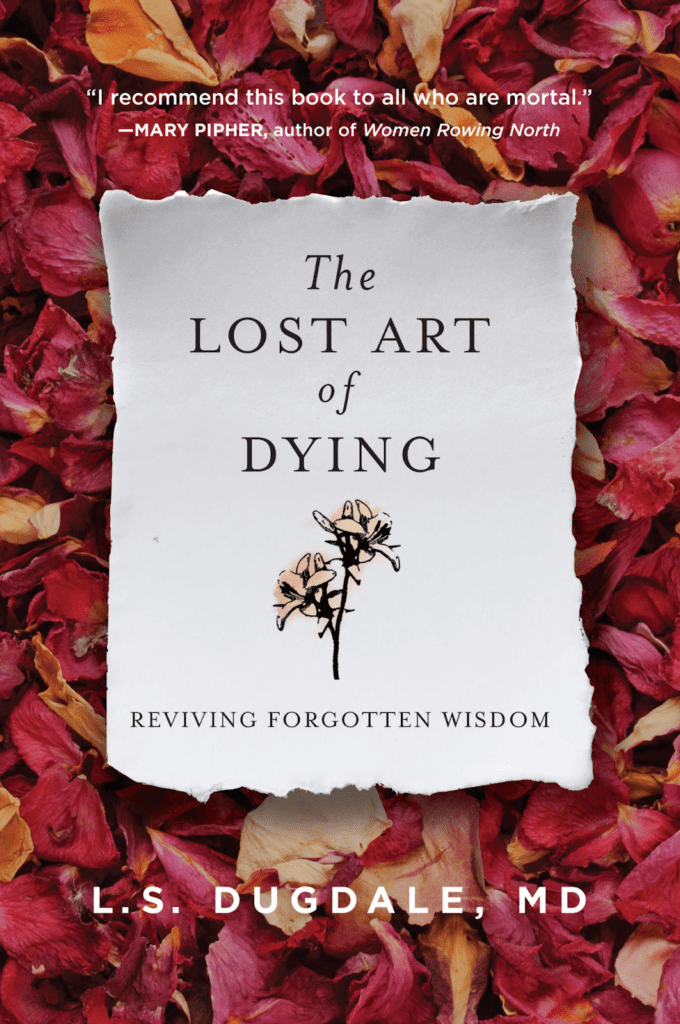Hope, Human Flourishing, and Higher Education with Lydia Dugdale, Jonathan Wilson-Hartgrove, and Brandon Vaidyanathan

As part of the Virtues & Vocations webinar series, Conversations on Character and the Common Good, we are pleased to welcome Lydia Dugdale, Jonathan Wilson-Hartgrove, and Brandon Vaidyanathan to discuss Hope, Human Flourishing, and Higher Education. Dugdale is a Professor of Medicine and Director of the Center for Clinical Medical Ethics at Columbia University, Wilson-Hargrove is Assistant Director for Partnerships and Fellowships at Yale University’s Center for Public Theology and Public Policy, and Vaidyanathan is Associate Professor and Chair of the Department of Sociology at The Catholic University of America. Through their research, each has developed a unique emphasis on the importance of hope and its role in human flourishing. The live conversation will include time for audience questions.
Meet the Faculty: Suzanne Shanahan
Suzanne Shanahan is Leo and Arlene Hawk Executive Director and Professor of the Practice at Notre Dame’s Center for Social Concerns Shanahan’s research focuses on understanding the refugee experience in East Africa, the Middle East, and Southeast Asia with special attention to how displaced persons construct moral boundaries around what is right, just, and fair. Her current research also examines the causes and consequences of domestic child sex trafficking for children and families in the United States. Shanahan Director of the Virtues & Vocations Initiative—a national forum seeking to cultivate character, purpose and meaning in pre-professional and professional education. She has a BA from Johns Hopkins and a Ph.D. from Stanford.
Meet the Speakers

Lydia Dugdale
Lydia Dugdale, MD, MAR (ethics), is a Professor of Medicine at Columbia University Vagelos College of Physicians and Surgeons and Director of the Center for Clinical Medical Ethics. She also serves as Associate Director of Clinical Ethics at NewYork-Presbyterian Hospital/Columbia University Irving Medical Center.
A practicing internist, Dugdale moved to Columbia in 2019 from Yale University, where she previously served as Associate Director of the Program for Biomedical Ethics. Her scholarship focuses on end-of-life issues, medical ethics, and the doctor-patient relationship. She edited Dying in the Twenty-First Century (MIT Press, 2015) and is author of The Lost Art of Dying (HarperOne, 2020), a popular press book on the preparation for death.
Jonathan Wilson-Hartgrove
Jonathan Wilson-Hartgrove is a spiritual writer, preacher, and community-cultivator. He serves as Assistant Director for Partnerships and Fellowships at Yale University’s Center for Public Theology and Public Policy.
A native of North Carolina, Jonathan is a graduate of Eastern University and Duke Divinity School. In 2003, Jonathan and his wife Leah founded the Rutba House, a house of hospitality where the formerly homeless share community with the formerly housed. Jonathan also founded the School for Conversion, a popular education center that works to make “surprising friendships possible” in Durham, North Carolina. He is an Associate Minister at the historically black St. Johns Missionary Baptist Church.
Jonathan is a co-complier of the celebrated Common Prayer: A Liturgy for Ordinary Radicals, and the author of several books on Christian spirituality, including Reconstructing the Gospel, Strangers at My Door, The Awakening of Hope, The Wisdom of Stability, and The New Monasticism. He is also co-author, with Reverend Dr. William Barber II, of The Third Reconstruction: Moral Mondays, Fusion Politics, and the Rise of a New Justice Movement.
A Baptist who draws on the broad Christian tradition and its monastic witnesses, Jonathan is a leader in the Red Letter Christian movement and the Poor People’s Campaign: A National Call for Moral Revival. He speaks often about spirituality and faith in public life to churches and conferences across the denominational spectrum and has given lectures at dozens of universities and seminaries, including Calvin College, MIT, Bethel, Duke, Yale, Princeton, Jewish Theological, Perkins, Wake Forrest, St. John’s, DePaul, and Baylor.
Brandon Vaidyanathan
Dr. Brandon Vaidyanathan is Associate Professor and Chair of the Department of Sociology at The Catholic University of America. He holds bachelor’s and master’s degrees in Business Administration from St. Francis Xavier University in Nova Scotia and HEC Montreal respectively, and a Ph.D. in Sociology from the University of Notre Dame.
Dr. Vaidyanathan’s research examines the cultural dimensions of religious, commercial, medical, and scientific institutions, and has been published in journals such as Business and Society, Journal of the American Academy of Religion, Social Forces, Social Problems, Sociology of Religion, Journal for the Scientific Study of Religion, Journal for the Theory of Social Behavior, and Work, Employment, and Society. His research has been funded by grants from the John Templeton Foundation, Templeton Religion Trust, and the Lilly Endowment.
Experience the Event
Monday, August 28, 2023 12:00 pm

As part of the Virtues & Vocations webinar series, Conversations on Character and the Common Good, we are pleased to welcome Lydia Dugdale, Jonathan Wilson-Hartgrove, and Brandon Vaidyanathan to discuss Hope, Human Flourishing, and Higher Education. Dugdale is a Professor of Medicine and Director of the Center for Clinical Medical Ethics at Columbia University, Wilson-Hargrove is Assistant Director for Partnerships and Fellowships at Yale University’s Center for Public Theology and Public Policy, and Vaidyanathan is Associate Professor and Chair of the Department of Sociology at The Catholic University of America. Through their research, each has developed a unique emphasis on the importance of hope and its role in human flourishing.
Book: The Lost Art of Dying: Reviving Forgotten Wisdom by Lydia Dugdale

From the publisher: As a specialist in both medical ethics and the treatment of older patients, Dr. L. S. Dugdale knows a great deal about the end of life. Far too many of us die poorly, she argues. Our culture has overly medicalized death: dying is often institutional and sterile, prolonged by unnecessary resuscitations and other intrusive interventions. We are not going gently into that good night—our reliance on modern medicine can actually prolong suffering and strip us of our dignity. Yet our lives do not have to end this way.
Centuries ago, in the wake of the Black Plague, a text was published offering advice to help the living prepare for a good death. Written during the late Middle Ages, ars moriendi—The Art of Dying—made clear that to die well, one first had to live well and described what practices best help us prepare. When Dugdale discovered this Medieval book, it was a revelation. Inspired by its holistic approach to the final stage we must all one day face, she draws from this forgotten work, combining its wisdom with the knowledge she has gleaned from her long medical career. The Lost Art of Dying is a twenty-first century ars moriendi, filled with much-needed insight and thoughtful guidance that will change our perceptions. By recovering our sense of finitude, confronting our fears, accepting how our bodies age, developing meaningful rituals, and involving our communities in end-of-life care, we can discover what it means to both live and die well. And like the original ars moriendi, The Lost Art of Dying includes nine black-and-white drawings from artist Michael W. Dugger.
Dr. Dugdale offers a hopeful perspective on death and dying as she shows us how to adapt the wisdom from the past to our lives today. The Lost Art of Dying is a vital, affecting book that reconsiders death, death culture, and how we can transform how we live each day, including our last.
For more information, click here.
Book: The Awakening of Hope: Why We Practice a Common Faith by Jonathan Wilson-Hartgrove

From the publisher: According to Jonathan Wilson-Hartgrove, faithful action is always inspired and sustained by common convictions—the basic truths that have sustained God’s people throughout every generation.
The Awakening of Hope re-presents Christian faith by beginning with stories of faithful witness and asking, Why? Why do Christians eat together? Why do we fast? Why would we rather die than kill? These are the questions that help us see why creation and the fall, covenant and community, ethics and evangelism matter.
This book is a contemporary catechism, celebrating lives and stories that wouldn’t make sense if the gospel were not true. And then going one step further, this project shares the good news of Jesus and the way of life that he makes possible.
For more information, click here.
Book: Mercenaries and Missionaries: Capitalism and Catholicism in the Global South by Brandon Vaidyanathan

From the Publisher: Mercenaries and Missionaries examines the relationship between rapidly diffusing forms of capitalism and Christianity in the Global South. Using more than two hundred interviews in Bangalore and Dubai, Brandon Vaidyanathan explains how and why global corporate professionals straddle conflicting moral orientations in the realms of work and religion. Seeking to place the spotlight on the role of religion in debates about the cultural consequences of capitalism, Vaidyanathan finds that an “apprehensive individualism” generated in global corporate workplaces is supported and sustained by a “therapeutic individualism” cultivated in evangelical-charismatic Catholicism.
Mercenaries and Missionaries uncovers a symbiotic relationship between these individualisms and shows how this relationship unfolds in two global cities—Dubai, in non-democratic UAE, which holds what is considered the world’s largest Catholic parish, and Bangalore, in democratic India, where the Catholic Church, though afflicted by ethnic and religious violence, runs many of the city’s elite educational institutions. Vaidyanathan concludes that global corporations and religious communities create distinctive cultures, with normative models that powerfully orient people to those cultures—the Mercenary in cutthroat workplaces, and the Missionary in churches. As a result, global corporate professionals in rapidly developing cities negotiate starkly opposing moral commitments in the realms of work and religion, which in turn shapes their civic commitment to these cities.
